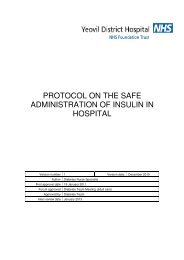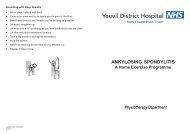Infertility Investigations and treatments.pmd
Infertility Investigations and treatments.pmd
Infertility Investigations and treatments.pmd
You also want an ePaper? Increase the reach of your titles
YUMPU automatically turns print PDFs into web optimized ePapers that Google loves.
Leaflet No. 6501007<br />
07/07<br />
If you have any questions,<br />
please contact Sr. Helen Butt<br />
or any of the nurses on Jasmine Ward.<br />
01935 384301 (Direct line)<br />
<strong>Infertility</strong> <strong>Investigations</strong><br />
<strong>and</strong> Treatments<br />
Department of Gynaecology
Glossary<br />
Andrologist A specialist in <strong>and</strong>rology.<br />
Andrology Study of the male reproductive system <strong>and</strong><br />
hormones.<br />
Anovulation No ovulation - eggs not produced.<br />
Clomiphene Tablets to stimulate the ovaries to produce eggs.<br />
Fertilisation The process of a sperm <strong>and</strong> egg combining<br />
which can result in a pregnancy.<br />
GnH Gonadotrophin-injection (hormonal) stimulation of<br />
the ovaries to produce eggs.<br />
Hystero-salpingogram An X-ray which shows the flow of a radioopaque<br />
liquid through the uterus <strong>and</strong> Fallopian<br />
tubes.<br />
IUI Intra-uterine insemination - artificial transfer of<br />
good quality sperm into the uterus via a fine<br />
tube passed through the cervix.<br />
IVF In vitro fertilisation - “Test Tube Baby”. Sperm<br />
<strong>and</strong> eggs are collected separately <strong>and</strong> mixed<br />
together in the laboratory. When the egg(s) is<br />
fertilised, it is introduced into the uterus.<br />
(NOT AVAILABLE AT YEOVIL)<br />
Laparoscopy Procedure of viewing the abdominal <strong>and</strong> pelvic<br />
organs by passing a fine telescope into the<br />
abdomen through a tiny incision under general<br />
anaesthetic.<br />
Ovulation The process of releasing the egg from the ovary.<br />
Ovulation Induction The process of stimulating the ovaries with drugs<br />
to produce <strong>and</strong> release the eggs.<br />
Ultrasonographer The person trained to do the scans.<br />
Ultrasonography Scans using ultrasound.<br />
<strong>Infertility</strong> <strong>Investigations</strong> <strong>and</strong> Treatments<br />
This booklet tells you about the aims <strong>and</strong> objectives of the <strong>Infertility</strong> Clinic<br />
<strong>and</strong> the work undertaken for couples who are experiencing difficulty in<br />
conceiving.<br />
One in six couples seek specialist help <strong>and</strong> advice concerning fertility.<br />
Some couples are trying for a subsequent addition to their family. We<br />
recognise that infertility has a profound emotional effect, as well as being a<br />
physical problem. We hope the clinic at Yeovil will meet both the physical<br />
<strong>and</strong> emotional needs of the couple seen. As you attend the clinic, you will<br />
be encouraged to ask questions <strong>and</strong> explore your feelings.<br />
The Clinic<br />
We have an established weekly clinic. Each couple are allocated a 15-30<br />
minute appointment. This allows enough time for you to feel relaxed, to be<br />
able to express your views <strong>and</strong> feelings <strong>and</strong> for the infertility team to<br />
assess <strong>and</strong> recommend the investigations <strong>and</strong> treatment appropriate for<br />
you. The clinic provides a high st<strong>and</strong>ard of professional expertise<br />
combined with individual <strong>and</strong> sympathetic patient care.<br />
Facilities Available<br />
1. Assessment of male <strong>and</strong> female causes of infertility.<br />
Andrology<br />
Laparoscopy/hysteroscopy<br />
Biochemical tests<br />
Ultrasonography<br />
2. Ovulation induction<br />
Tablets<br />
Injections<br />
3. Intra-uterine insemination (IUI)<br />
With partner’s sperm<br />
4. Male referral<br />
Patients may be referred to the Consultant<br />
Urologist/Andrologist
At the clinic<br />
First appointment (30 mins)<br />
This appointment is used to explain the structure <strong>and</strong> aims of the clinic, to<br />
assess the medical background which may affect reproduction <strong>and</strong> to examine<br />
both partners. Some information may be available from tests organised by<br />
your GP <strong>and</strong>, where necessary, further tests will be arranged.<br />
The tests<br />
Many of the following tests will be carried out during fertility assessment.<br />
This section lists all the tests with a short explanation of what they are <strong>and</strong><br />
what they mean.<br />
• Semen Analysis<br />
The male partner will be asked to produce a semen sample at home. A<br />
specimen container will be provided.<br />
Repeat samples may be required at 2-3 week intervals <strong>and</strong> perhaps after<br />
10 weeks.<br />
These samples are checked for potential sperm problems.<br />
• Hormone Analysis<br />
Blood tests may be carried out to check that ovulation occurs satisfactorily.<br />
• Tests for Tubal Patency<br />
This is a test to check that the Fallopian Tubes are not blocked. This test<br />
may be undertaken by a laparoscopy or a hystero-salpingogram (a<br />
specialised X-ray).<br />
• General Health Test<br />
A range of tests will also be carried out including Rubella (German<br />
Measles) immunity. All women are advised to start taking folic acid<br />
supplements. Advice is also given to both you <strong>and</strong> your partner about<br />
drinking <strong>and</strong> smoking. Smoking has a detrimental effect on fertility <strong>and</strong><br />
you are advised to give up smoking.<br />
Subsequent appointment (15 mins)<br />
When all the results of the tests are available, you will be seen to<br />
discuss a plan of treatment based on your individual requirements.<br />
There will be an opportunity for you to put forward your views <strong>and</strong> ask<br />
questions.<br />
Treatments could fall into one or more of the following:<br />
• Ovulation Induction<br />
Tablets - 6 - 12 months<br />
Injections with monitoring - 3 cycles maximum<br />
• IUI<br />
3 cycles maximum with tablets <strong>and</strong>/or injections<br />
• Tubal problems<br />
If appropriate, surgery may be offered<br />
• Sperm problems<br />
IUI <strong>and</strong>/or referral to the Consultant Urologist or advice on referral to<br />
another unit for other forms of treatment.<br />
Other treatment options (like IVF, ICSI etc) not available in this hospital but<br />
available in other centres, could be discussed.






